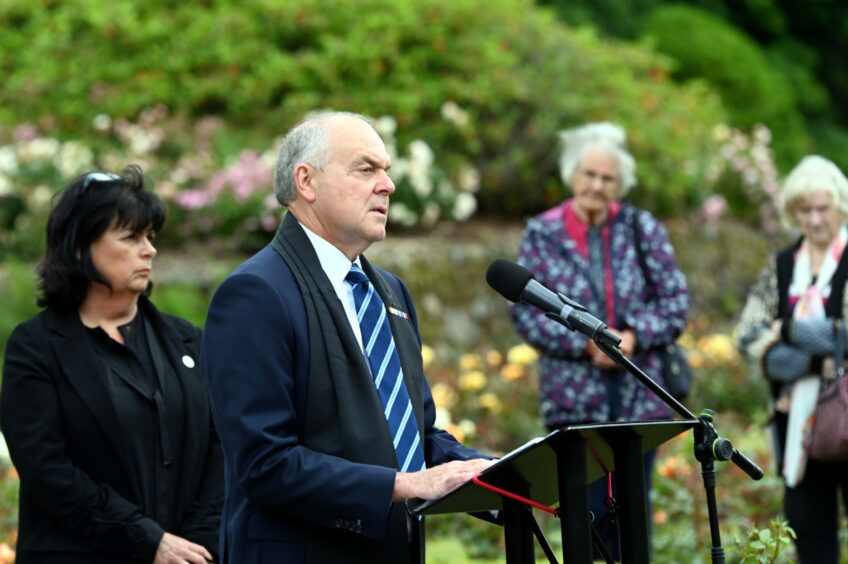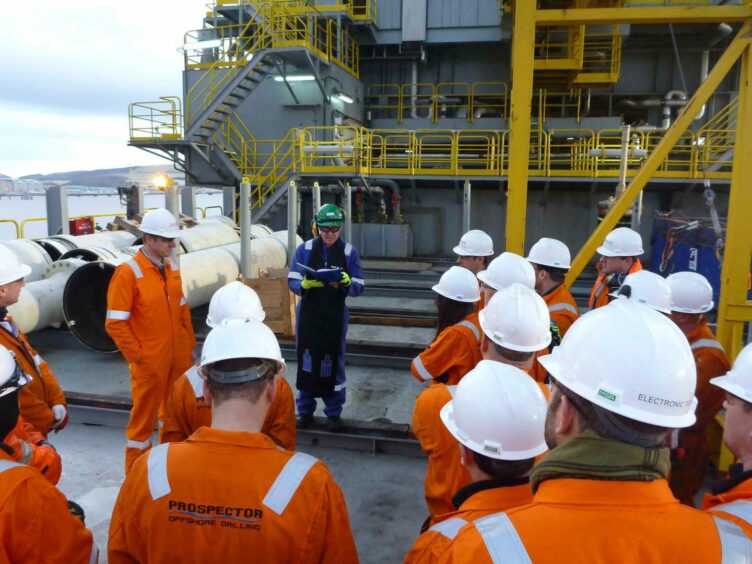
Currently averaging an installation visit around once a week, Reverend Gordon Craig’s schedule keeps him busier than many of the North Sea’s offshore travellers.
“I certainly get more hours in the choppers than most the way it is at the moment,” he says, “But it’s not always like that – I think we’re just catching up post COVID.”
As chaplain to the UK oil and gas industry, he regularly visits platforms and vessels up and down the North Sea basin.
At the time of writing, Rev Craig is preparing for a visit to the Elgin platform, with later journeys to Britannia, Golden Eagle, Gannet and Culzean – among several others – all to come before the start of December.
“I’m in a very privileged position because as chaplain we get to see all companies, all installations – certainly in the offshore world in a way that not many people do.
“Visiting a different platform with a different operator every week is a real privilege, and you can see how different operators are operating under different constraints and how they deal with issues that are coming up, and also get a feel for the entire workforce.”
His visits come amid a time of growing strife on- and offshore, with workforce relations having deteriorated in recent months on the back of rising living costs and record profits by oil and gas producers.
Despite the heightened tensions, Rev Craig believes this is not unique to the North Sea environment. “I think the mood offshore is just exactly the same as the mood onshore in one sense,” he notes. “People are worried – no matter where you are or where you work or where you live, costs are going up.”
Changing challenges
The role of the chaplaincy is perhaps best highlighted in the face of those worries.
Founded in the late 1980s by Reverend Andrew Wylie, the UK Oil and Gas Chaplaincy is an ecumenical organisation that provides care and support for the sector’s workforce and their families, regardless of faith.
“The role of the chaplaincy is simply to support the workers and their families within the industry through various means,” Rev Craig explains. “We can do so practically and financially through the work of our trust funds, where we try to support families who are suffering financial hardship, normally as a result of long-term sickness.”
“We also provide pastoral care, if you like, for families who are struggling with anything that’s going on their lives.”
Together with its trust arm, Rev Craig has overseen the chaplaincy and its work since his appointment in 2012, and works to provide support and spiritual guidance to anyone with any connection to the sector.
The organisation also maintains a Book of Remembrance to commemorate those who have died offshore in UK waters and holds a service of remembrance in Aberdeen on the first Saturday of November each year.
In his position, Rev Craig also sees the changing nature of issues faced by the workforce – something that has been brought even more to the fore in the wake of the pandemic.
“One of the things we’ve seen, for instance, in the work of our trust fund is that pressures on the NHS put further pressures on workers,” he says.
“For instance, if you can’t go work offshore because you have a knee problem and you can’t get that knee sorted because NHS waiting times have gone up, then that means you’re out of work for longer and that is putting more pressure on your income and your ability to support your family.”
“That has been a definite change where people are struggling.”
Speaking anecdotally, he also says many workers who left the sector during the wake of COVID-19 have not returned and may have found roles either onshore, or in other industries. While offshore work rotations may still suit some people, he suggest many are now keen to stay closer to home and families.
Mental health
There has been progress too, however, not least in a greater willingness to open up about mental health – both at the individual and corporate level. As “a people thing” he says the topic is at the core of the chaplaincy’s work, and attitudes have improved “immensely” over the last few years as the stigma around mental health has been at least partially “eroded”.
“I think with more awareness also comes a frustration perhaps, that we can’t do more because we don’t have the means,” he muses. “We’re doing an awful lot, but there’s a limit to what the industry can do given that the workforce is so diverse – in its geographical location for a start.
“How do you recommend support to people if they live in Liverpool or Middlesbrough or wherever, and you’re based in Aberdeen?”
Even colleagues may only see each other for a few weeks during a shift rotation, before returning to homes spread across the UK – something that makes a forming reliable support networks more difficult compared to those working in a central office with predictable hours.
Rev Craig makes the case for something “focused centrally” that could provide the necessary resources, though is unsure what or how this would look like, in order to meet such diverse and widespread needs.
“I feel that obviously it’s good to talk, but actually we need to go further than that. How do we get there and that further step – that’s something which certainly is exercising my mind at times.”
Spiritual vs virtual
The topic raises a wider question around the future role of the chaplaincy, particularly as the dynamics of the energy workforce change. “We’ve been talking about the offshore industry, but I also cover the onshore side of it and that’s a huge challenge at the moment,” he says.
The organisation is now having to work out how to engage with a workforce that is now no longer as office based as it used to be, as many people increasingly opt to work flexibly and/or from home.
Increasingly the chaplaincy is sharing its messages virtually, shown most recently in a service reflecting on the passing of Queen Elizabeth II, in which Rev Craig shared his own experiences of serving Her Majesty and her care for those working offshore.
However, working entirely in a virtual medium “doesn’t sit nicely” with Rev Craig’s belief in how the chaplaincy should interact with those it serves, and its requirement for spontaneity and “personal touch” of face-to-face interactions.
“I’m still working on the challenge,” he says.
Recommended for you

 © Supplied by UK Oil and Gas Chapl
© Supplied by UK Oil and Gas Chapl